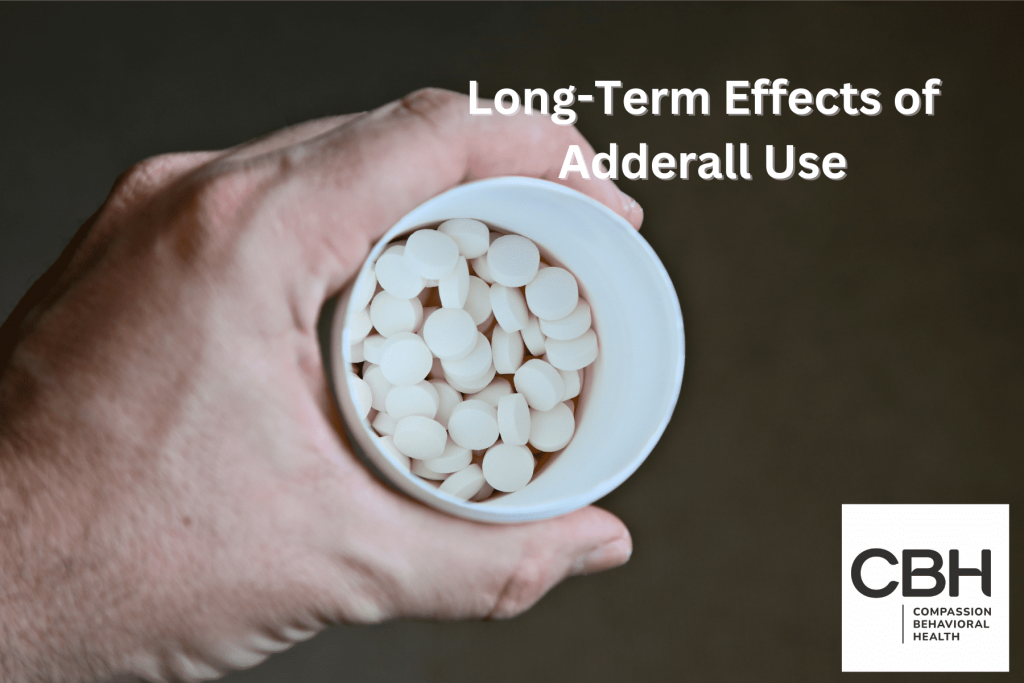In our modern age, there’s a growing concern about the misuse of prescription drugs, especially Adderall, among university students and young adults. While Adderall has legitimate medical applications, primarily for treating Attention Deficit Hyperactivity Disorder (ADHD) and narcolepsy, its misuse can lead to significant health implications. This article dives deep into understanding the long-term effects of Adderall use and its broader impact on both individuals and society.
Understanding Adderall and Its Intended Use
Before looking at its abuse, it is essential to understand what Adderall is at its core and what it is intended for medically.
When it comes to understanding Adderall, it is crucial to delve into its composition and purpose. Adderall is a prescription medication that belongs to a class of drugs known as stimulants. Specifically, it is an amphetamine, which means it affects the central nervous system by increasing certain chemicals in the brain.
What is Adderall?

Adderall, with its unique formulation, is designed to address specific medical conditions. Primarily, it is prescribed to individuals diagnosed with Attention Deficit Hyperactivity Disorder (ADHD). This neurodevelopmental disorder affects both children and adults, causing difficulties in concentrating, impulsivity, and hyperactivity. Adderall works by enhancing the activity of neurotransmitters, such as dopamine and norepinephrine, which play a crucial role in attention and impulse control.
It is important to note that Adderall should only be used under the supervision and guidance of a healthcare professional. The dosage and duration of use are determined based on the individual’s specific needs and response to the medication.
Medical Uses of Adderall

While ADHD is the primary condition for which Adderall is prescribed, there are other medical uses for this medication. In some cases, it may be employed in the treatment of narcolepsy, a chronic sleep disorder characterized by excessive daytime sleepiness and sudden, uncontrollable episodes of falling asleep.
For individuals with narcolepsy, Adderall can help regulate sleep patterns and promote wakefulness during the day. By stimulating the central nervous system, it aids in reducing the frequency and intensity of sudden sleep attacks, allowing individuals to maintain a more regular sleep-wake cycle.
It is important to emphasize that the use of Adderall for narcolepsy or any other condition should be determined by a healthcare professional. Self-medication or misuse of this medication can lead to adverse effects and potential harm.
Adderall is a prescription medication primarily used to treat ADHD and, in some cases, narcolepsy. Increasing the activity of certain neurotransmitters in the brain, helps individuals with ADHD concentrate better and reduces impulsive behavior. When used under the guidance of a healthcare professional, Adderall can be a valuable tool in managing these conditions and improving the overall quality of life.
The Rise of Adderall Abuse

Unfortunately, due to certain reasons, there has been a disturbing rise in Adderall abuse, especially among young adults and students.
The misuse of Adderall has become a significant concern in recent years, with the number of reported cases steadily increasing. This troubling trend has raised questions about the factors contributing to this phenomenon and the potential consequences it may have on individuals and society as a whole.
Factors Contributing to Adderall Misuse
One key factor is the issue of readily available prescriptions and illegal sales, enabling easy access. Adderall, a prescription medication primarily used to treat attention deficit hyperactivity disorder (ADHD), has found its way into the hands of those who do not have a legitimate medical need for it. This accessibility has created an environment where misuse and abuse can thrive.
Additionally, the allure of Adderall as a cognitive enhancer has contributed to its misuse. Many individuals, especially students and young adults, have turned to Adderall to enhance their cognitive performance. The drug is reputed for its ability to boost concentration, energy levels, and alertness, making it an appealing choice for those seeking an academic or professional edge.
Furthermore, societal pressures and expectations play a significant role in the misuse of Adderall. In an increasingly competitive world, the pressure to excel academically or professionally can be overwhelming. Students, in particular, face immense pressure to perform well and meet high expectations. This pressure, coupled with the “study drug” stereotype that associates Adderall with academic achievement, has led to its widespread misuse among students.
The Prevalence of Adderall Abuse Among Students

Studies show that Adderall is among the most abused drugs on college campuses. The prevalence of Adderall misuse among students is a cause for concern, as it not only poses significant health risks but also undermines the integrity of the educational system.
The competitive nature of higher education, combined with the desire to achieve academic success, has created an environment where students are willing to go to extreme lengths to gain an advantage. The misuse of Adderall has become a common practice among students who believe it will help them stay focused and study for extended periods without fatigue.
However, the consequences of Adderall abuse can be severe. Prolonged use or misuse of the drug can lead to a range of physical and psychological issues, including increased heart rate, elevated blood pressure, insomnia, anxiety, and even addiction. Moreover, relying on Adderall as a study aid can hinder the development of essential learning skills and create a false sense of achievement.
The rise in Adderall abuse is a complex issue with various contributing factors. It is crucial to address this problem promptly to protect the well-being of individuals and preserve the integrity of educational systems. By raising awareness, providing support, and promoting responsible medication use, we can work towards creating a safer and healthier environment for all.
Short-Term Effects of Adderall Abuse
Abusing Adderall comes with a slew of dire short-term effects. It is important to understand the physical and psychological impact that this drug can have on individuals.
Physical Impact of Adderall Abuse

Abusing the drug can result in increased body temperature, heart rate, and blood pressure. These physiological changes can put a tremendous strain on the body, leading to potential health complications. Additionally, prolonged abuse of Adderall can lead to physical exhaustion and dehydration due to increased energy expenditure and decreased appetite.
Moreover, individuals who abuse Adderall may experience insomnia, making it difficult for them to get adequate rest and rejuvenation. The lack of sleep can further exacerbate the physical toll that Adderall abuse takes on the body.
Furthermore, intense periods of paranoia can be a distressing side effect of Adderall abuse. Individuals may become excessively suspicious of others, feeling as though they are being watched or targeted. This heightened state of paranoia can lead to social isolation and strained relationships.
Psychological Consequences of Short-Term Abuse

On a psychological level, people may experience a sense of irritability, anxiety, mood swings, and even manic episodes. The stimulant properties of Adderall can cause individuals to feel on edge and easily agitated, leading to conflicts in personal and professional relationships.
Moreover, the abuse of Adderall can have a significant impact on an individual’s emotional well-being. The drug’s effect on the brain’s neurotransmitters can result in rapid mood swings, causing individuals to experience intense highs and lows within a short period. This emotional rollercoaster can be exhausting and overwhelming for those who abuse Adderall.
In extreme cases, Adderall abuse can lead to hallucinations and delusional thinking. The altered state of consciousness caused by the drug can distort an individual’s perception of reality, leading to experiences that are not grounded in truth. These hallucinations and delusions can further contribute to declining mental health and overall functioning.
It is crucial to recognize and address the short-term effects of Adderall abuse to prevent further harm to individuals’ physical and psychological well-being. Seeking professional help and support is essential in overcoming the challenges associated with Adderall abuse and restoring a healthy and balanced life.
Long-Term Effects of Adderall Abuse
The graver concern, however, lies in the long-term effects of Adderall abuse.
Chronic Health Issues Associated with Long-Term Adderall Abuse
Repeated misuse can lead to serious ailments over time, such as cardiovascular disease, malnutrition due to suppressed appetite, and potential long-term effects on the brain’s ability to produce dopamine naturally.
Mental Health Implications of Prolonged Adderall Misuse
The extended abuse of Adderall can lead to mental health issues such as paranoia, psychosis, and depression. Dependence on the drug can also lead to a condition known as amphetamine addiction.
Moreover, discontinuing Adderall after prolonged misuse can result in Adderall withdrawal symptoms, underscoring the need for professional guidance during cessation.
Treatment and Recovery from Adderall Addiction
Steps Towards Recovery
Recovery from Adderall addiction is possible with professional help, detoxification, therapy, and support groups.
Resources for Adderall Addiction Help

Various resources are available to support the recovery journey, including treatment centers, therapists, and support networks like Narcotics Anonymous. Remember, it’s never too late to seek help.
Understanding the severe implications of Adderall abuse is crucial to mitigating its damaging effects. Awareness, early detection, and seeking professional help for Adderall addiction are vital elements in combating this issue.
At Compassion Behavioral Health, we offer numerous levels of care for substance abuse disorders including Adderall addiction. Each program is individually designed to focus on producing long-term, sustainable, health, and recovery. To learn more about our Adderall addiction treatment program, call us or contact us today.



